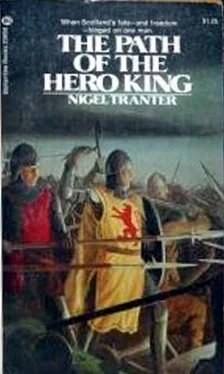Turning west again, on a well-trodden track down the steep ravine of the Snaid, here practically a prolonged waterfall, they emerged once more at the loch. But it was a very different beach.
Here were more houses, and from them a stone jetty thrust out into the dark waters. Not a few boats were moored or drawn up thereabouts;
but tied to the jetty was one the like of which the visitors had never seen-save only Campbell. It was long and narrow, high of prow and stern, with a single central mast on which hung a great boom with furled sail. At bows and stern were raised platforms and double-banked along each side were the black ports for.
many oars.
A galley! Bruce exclaimed.
A chiefs galley! Yours, MacGregor?
Mine.
But how, a Gods name, comes a galley on Loch Lomond? A sea craft. On an inland water?
Where MacGregor goes, there goes his galley.
But how, man? You come from Glenorchy, in the north, do you not?
Above Lorn.
My galleys ride on Loch Etive, of the Western Sea, he said.
When I would come to these southern lands of Clan Alpine, I sail out into that sea, and down through the isles, to Tarbert at the head of Kintyre. There my Gregorach draw my galley out, set it on round tree-trunks, and pull it across the low neck of land one mile to Loch Fyne. I sail down that loch, to Bute Kyle, and then up Loch Long. Only two miles divide the head of Long from this Lomond. Again my oarsmen draw the galley across the land. On this Lomond, then, my galley is supreme.
I faith heres a wonder…!
You learned that trick from the Northmens king, Neil Campbell observed sourly.
Magnus, Hakons good son did the same, before Largs fight. When he burned the Lennox.
You mistake, Wry-mouth, the other gave back.
Hakon learned it from MacGregor. Clan Alpine has been so doing since before there was ever a Campbell to defile Argyll!
Gods patience …!
And we sail in your galley? the King intervened.
What else? When you sail with MacGregor.
Now there were men all round them, fierce-looking- but no fiercer than themselves-bristling with arms. To one, MacGregor gave a command. He blew loud and long on a great curling cattle horn, the whooping, moaning ululations echoing and reechoing amongst all the enclosing hills. Bruce and his companions, after weeks of hiding, could scarcely forbear to demand quiet, secrecy, abashed at this blatant drawing of attention to themselves. But clearly they were now in the company of no skulkers. MacGregor of MacGregor, on his own heather, was not the man on whom to urge discretion.
The horn had been the signal for the galley to be manned. Men poured aboard in surprising numbers, equipped with their great rawhide and studded targes, circular shields, which they proceeded to hang over the sides of the vessel, forming a sort of armour plating thereon.
Where were all these when we needed them? Edward Bruce growled.
These past days, when we were hunted like beasts, just across this loch! The MacGregor is something tardy in his duty, aye!
Better tardy than never. Or against us, the King murmured, lower-voiced.
Indeed, I think he is not here for my sake, even now. He is doing this because the Dewars besought him. And for his friend Lennoxs sake. Let us be grateful for such mercies as come our way, brother.
The chief ushered his visitors aboard, the lesser men to the bow platform, the greater, with himself, to the stern. Bruce was surprised to see how many oars the vessel used, twenty on each side, in two banks, long powerful sweeps, each worked by two men seated 00 cross thwarts. With a relay of swordsmen standing by to take their turn at the sweeps. MacGregor must have had nearly 200 men aboard.
They cast off immediately and efficiently, and the huge square sail was
unfurled-with all that oar-power, and since there was little wind,
Bruce imagined more to display the MacGregor arms crossed oak-tree and
sword, painted hugely thereon, than for Propulsion. With surprisingly
little splash and fuss for so multiple amotive-power, they moved out
into the night-bound waters, and swung southwards, down-loch.
It made a very strange sensation for Bruce and his party to be sailing openly, indeed dramatically, on the great sheet of water which had for so long been their bugbear. Especially when, presently, the helmsman began to chant a lilting haunting melody, rhythmic and repetitive, in time with the beat of the oars, which the rowers took up in deep pulsing power-one of the many boat songs of the West. To the surge and thrust and ache of this they thrashed down Loch Lomond, sweeps flashing, spray flying, at a speed which none of the Lowlanders had believed possible on water. Greyhounds of the sea they knew these galleys to be called, but this headlong progress was beyond all their imagining, exhilarating, challenging.
This aspect of challenge preoccupied the fugitives. MacGregor might be puissant and redoubtable, but the MacDougall Lord of Argyll and Lorn was still more powerful. This shouting aloud of their presence might be magnificent, but it was surely foolhardy.
But when Bruce indicated as much to their host, he was met with scorn.
Who will question MacGregors galley? he asked simply.
Besides, there is no other on the loch.
At least they will know where we go.
Where MacGregor goes, the other amended.
Why should they believe King Bruce with him?
Loch Lomond broadens out to the south, and at its foot it is almost five miles wide, and dotted with islands. Ten or so miles down towards this the galley drove. Whether or not the chief was right and none dared to interfere with MacGregors galley, they saw no other boats throughout-although their passage must have been entirely evident to any who watched.
After perhaps an hour, with the widening of the loch, the looming black
shadows of the great mountains drew back and dwindled as they sailed
out of the Highlands and into Lennox. Bruce had quite expected that
they would be conducted to one of the many islands. These, after all,
would in the main belong to the Earl of Lennox, and might provide
refuges. But, no. The galley drove on through the island area without
diminution of speed, MacGregor himself directing the helmsman. The
regular splash of forty blades meeting the water in unison, the
creaking of oars, and the gasping pant of the men, dominated the night
with purpose. The smell of sweat was like a miasma that travelled with
the ship.
The foot of Lomond spreads out into flat level country, ranged only distantly by low hills. The galley, in fact, was making for the very southeast corner, where the River Endrick flowed in through far flung marshland. Now MacGregor slowed his rowers drastically, peering ahead keenly. Soon a leadsman in the bows was shouting soundings, as the water shoaled.
The chief pointed suddenly, and the helmsman nodded. Posts could be distinguished rising out of the water. Three of them were visible, obviously in a line.
The mouth of the Endrick, MacGregor mentioned.
Deep water channel.
They eased in towards the posts, and soon it was apparent that there was a long line of them. The galley was edging along very slowly now, following the posts closely. It was not long before there was a low black belt at either side of them, darker than the water-reed-beds. The channel, twisting now, was narrowing notably.
At length the chief called a halt and, oars raised upright, they nosed forward to one of the posts. The helmsman used a steering oar to manoeuvre the craft round, across the channel. Two men jumped down into the reeds and shallows. The water came barely to their middles.
Читать дальше












